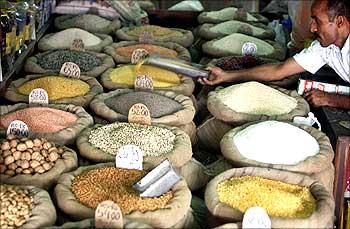 Traders say shortage will continue for a while, also feel govt crackdown on stock holdings worsening the problem
Traders say shortage will continue for a while, also feel govt crackdown on stock holdings worsening the problem
Despite government measures, the price of pulses have again started rising, on supply concerns from the recently ended kharif season and less than expected growth in the ongoing rabi sowing.
Chana (chickpea) for delivery in December on the benchmark National Commodity & Derivatives Exchange is up five cent or Rs 195 ito trade currently at Rs 5,141 a quintal since last Friday, when traders booked profits amid fear of further action by government or regulator.
On November 7, the Securities & Exchange Board of India levied up to 75 per cent margins for near-month contracts, increased as settlement day neared.
So, the chana price for delivery in December declined to Rs 4,946 a qtl by Friday.
“Despite the high margins, the chana price bounced back after a marginal decline, indicating that traders are holding pulses on expectations of a further price rise.
Also, the government took several steps like stock limits on stockists, including importers, coupled with raids and seizures.
These measures did not work to the extent the government was estimating.
This means traders anticipate pulses’ prices to remain firm,” said Ajay Kedia, managing director, Kedia Commodity Research, a city-based commodity trading company.
Prices of other pulses have also moved up, as with tur (pigeon pea).
Lemon tur and African tur saw a Rs 4-5 a kg rise in the past few days.
“While Indian Pulses and Grains Association (Ipga) is offering tur at Rs 100 a kg (to support the government’s campaign), the import cost works out to Rs 135 a kg.
"Tur is unlikely to decline below this (latter) level until the new crop hits the market in December,” said Bimal Kothari, vice-chairman of Ipga.
He said seizure of around 80,000 tonnes of imported pulses was choking supply, resulting in the price rise.
Ipga is in talks with the government of Maharashtra for immediate release of seized pulses, he added.
The first advance estimate of the government shows kharif pulses’ output at 5.56 million tonnes, well down from the target of seven mt and the 5.63 mt of actual output in the previous kharif season.
With a decline in output from local sources and continuous rise in demand, prices moved up sharply in recent months.
The government was estimating a sharp increase in sowing this rabi season but after its actions on traders and stockists, farmers had worries over returns and there has been only a 11 per cent increase in acreage so far this season.
The Indian Institute of Pulses Research forecasts annual demand at 39 mt by 2050.
This requires production to grow at an annual rate of 2.2 per cent, compared with the 0.9 per cent rise over the past decade.
“The government needs to focus on increase in area and yield.
Actions on traders would discourage importers,” said Himat Chandra, partner, Trimurthi International, a trading entity at Navi Mumbai.
The image is for representational purpose only. Photograph: Reuters










